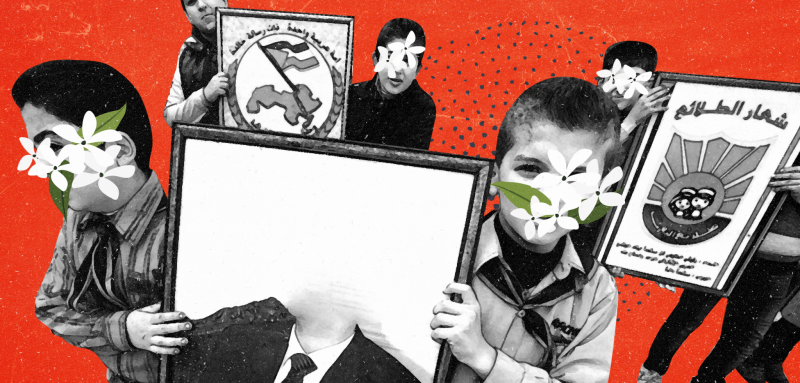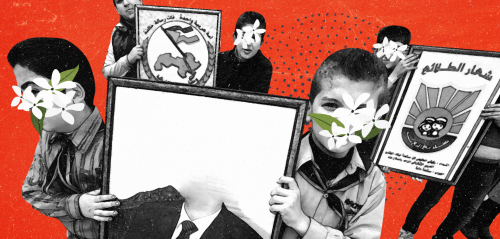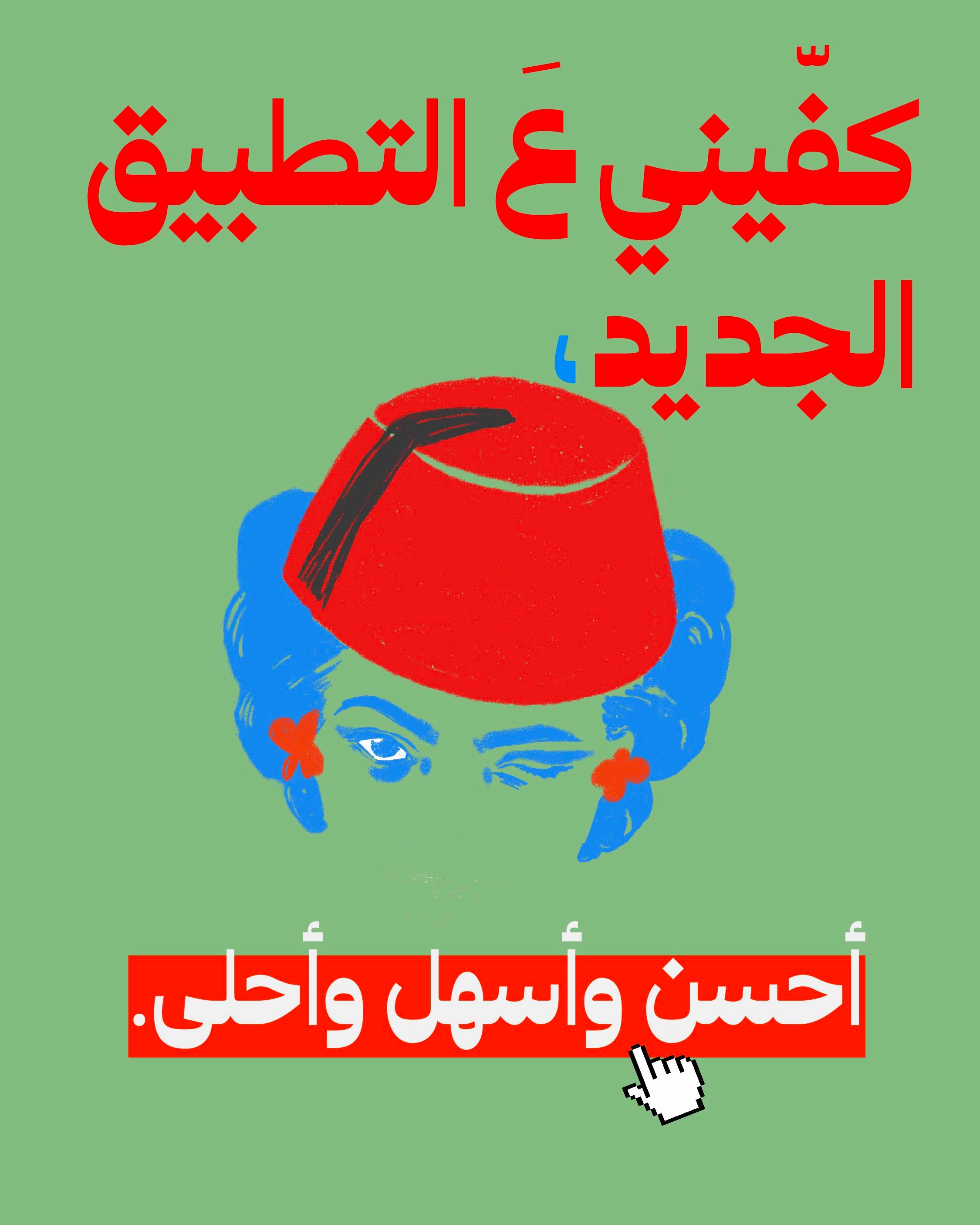I do not recall anything of my primary school memories in Syria, except for the morning chants and slogans! These slogans were a part of our daily indoctrination ritual by the Ba’ath Party in the school yard — without me, or any of my schoolmates, understanding what the words meant — before we sang the national anthem. Children in Syria, from the first grade, are compelled daily to repeat: “Always be ready to build and defend a unified social Arab nation,” in school yards while raising the Nazi salute, unaware of the content of these phrases.
Compulsory morning radio stations were also a daily ritual. They would begin with military commands such as “Troop Attention! / At Ease / Rest”, while other broadcasts consisting of slogans of the Ba’ath Party were voiced by the educational guide. He would say: “One Arab Nation”, and the students would respond in one collective voice: “With an eternal message!” Then: “Our goals?” for them to respond with: “Unity, liberty, and socialism”.
These broadcasts were forbidden for those who did not comply with the full vanguard dress code — which consists of a military-colored jacket, a “sedara” (cap) on the head, and a scarf tied around the neck bearing slogans of the Ba’ath Vanguards Organization. The punishment for those whose outfit lacked one of the specified components included beating with batons on open palms.
The Ba’ath Vanguards Organization was established in Syria in 1974, by decree of the ‘Regional Command of the Arab Socialist Ba’ath Party — Syria Region’, in a reproduction of a ready-made North Korean experiment. It was known to be a “political educational organization that includes children of the Syrian Arab region that are in the primary school level, and it works on raising them under a national, socialist education, drawing on its intellectual and ideological components from the Ba’ath Party’s ideology as well as the decisions of its national and regional conferences,” according to its founding statement.
Party Affiliation by Rage
I remember in fourth grade that a woman entered all the classrooms to say, “Tell your families that you all have to bring 45 Syrian pounds with you tomorrow, and whoever does not bring them will not be allowed to complete his/her education.”
Little did we know that this lady — who used to come at the beginning of every semester over the years, to take the then amount equivalent of one dollar — was actually taking a fee from us to join the ranks of the Ba’ath vanguards, who would force us to memorize chants and slogans we did not understand. Since that time until today, millions of Syrians are still registered in the ranks of the Ba’ath without even realizing that they are Ba’athists. Thus, Syrians may be the only people in the world that belong to the ranks of a ruling party without even realizing so, or remembering when they had joined!
Attending full school lessons was not as important as those party symbols, especially during the preparatory and secondary school stages — that is, during the Ba’ath youth stage, which is the stage that comes after the vanguard stage. We could run away through the main door, insult the principal, and even spit in his tea, but laxness in the dress code and the emblem was never tolerated.
Inside the classrooms, we used to study the achievements of the Ba’ath Party in countless terms that were difficult to memorize. In classrooms painted in gray and with windows covered in bars like those in prisons, we would memorize everything about its pioneering projects and the greatness of its innovation in bringing electricity to far villages, to return to our villages and find nothing of the necessities of life there. We would learn about its brilliant social, political, and economic way of thought, while most Syrians lived in extreme poverty.
The Syrian Baath and its system are dealing with Syrians in a manner inspired by colonialists: We, Syrians, aren’t a people ready to manage our own affairs and decide our own fate, and thus it must control our fates fearing for us from ourselves
These same lessons continued to be repeated until the university stage, when they took on the form of the subject of culture that most students succeeded in without much effort, but only if they understood the thinking of its theorists. It is enough for them to glorify, revere, and cite the achievements of the party and its leader — whether or not they even occurred — in order for them to pass, unlike the students who would constantly try to memorize this information and would not speak much praise of the party and its leader. This would cause them to fail the course for several years in a row, and their graduation may be delayed due to a lack in their Ba’athist culture.
Erasing Previous History
In each of its lessons, the history course in the Ba’ath curricula would talk about one of the ancient Syrian civilizations in about ten lines only. It would then link it in one way or another to Arabism and Islam, always stressing that the Phoenicians and the Canaanites were Arabs, and they were the ones who built Jerusalem, and therefore Jerusalem is Arab. Meanwhile, the nationalist book would take it upon itself to provide a lengthy detailed account on “the history of Syria,” talking about the period extending from the seventies of the past century up to the present day, as if the Ba’ath was erasing all the previous history that extends for thousands of years prior. Its curricula used to pair all the civilizational achievements of Syria with Arabism, the party’s vision, and the vision of its leader.
Despite the bloody dispute between the Ba’ath and political Islam, the Ba’ath curricula extensively taught Islam using the Sunni school of thought. Despite the propaganda, it could not defeat the existing sectarian beliefs. And so, a sixth-grade religion teacher, that is a member of a party group, in the “socialist” school in my city of Jabla asked us, “Are you all Alawites? Then, I will tell you that everything you are studying in your religion books is not true. This is a false religion...” Most of us were young Alawite men, and students of other sects in the meantime would listen to him with clear bewilderment but did not dare to argue.
As for our religion teacher, a female Ba’athist wearing the niqab (religious garb covering the head and face), in the second semester of the same year, she asked us the following question, “What will your family do if you watch pornographic films with them?” That day, I answered her, saying that we would not watch such movies with our family... She laughed and said, “By God, it looks like there is some good in you,” meaning us Alawites. She later on takes me aside, gives me a book that teaches Muslim prayer, and tells me, “If you do not perform what is in the book, you will stand on coals on the Day of Resurrection until your brain boils.”
Because of that incident, I began to pray, fast, and stand in front of the doors of my house repeatedly reciting religious phrases before entering. I would then recite them once again in front of the door of my room, and a third time in front of the bathroom door, until my father noticed, and he kept following me for several weeks until he found the book. He then tore it up and said to me, “I do not want any Muslim brothers in my house.” It was lucky for me that my father was an atheist.
I hated him a lot that day, and I saw him as a devil. I even used to imagine his brain boiling on the Day of Resurrection, until the day came when I entered the teachers’ room after a party meeting that they had stopped school and class hours for. I found the very same teacher without her veil and niqab, sitting in the lap of the same Alawite teacher who told us that the religion that we are studying is false. I saw how she was hugging him and how her hand was caressing his cheek, so I thanked my father and realized that they were all hypocrites.
“A Wise Leadership and a Foolish Nation”
In high school, I came across a teacher instructing on the subject of nationalism. He was a friend of the family and was very talkative and tended to dramatize things. He would always say that his dream was to become an official, and that his diploma in political science did not allow him to enter the arena of politics, and that the most he was able to get was being appointed as a teacher on nationalism.
He once told us that those who turned against the Syrian-Egyptian union (United Arab Republic) were traitors and secret agents. So, in the next class, I dared to bring him a historical document stating that the late Syrian President Hafez al-Assad was one of those who carried out the coup, so how could he describe him as a traitor?! That’s when his face went red, and he began to yell and recount the accomplishments of “the immortal” leader. The students then thanked me for wasting the boring class with some “action that I had stirred up”. And as soon as I got home, I found that he had beaten me there, to tell my family that I was harming myself with my behavior. He called me a “hooligan”, and said that “my problem is that I became a teenager too early, and I am now fully grown-up and mature in high school.” My father just laughed, a laugh of pride that I will never forget.
A 6th grade religion teacher, who is also a Ba’ath party member, in the “socialist” school in my city of Jabla asked: “Are you all Alawites? Then, I will tell you that everything you are studying in your books is not true. This is a fake religion...”
Following many generations of this scholastic indoctrination and the initiation of slogans, and after we vanguards grew up enduring ten years of war, we find despair dominating the youth of the Syrian interior. Nothing is more frustrating than the feelings of defeat that dominated the Syrian youth, the lack of confidence, the weakness of productivity, and the feeling of the inability to achieve any personal achievements in a country that only formally recognizes those with top or initial achievements, especially those who support them but are not able to change their situation or circumstances. The mere idea of criticizing authority is not even in their dictionary, aside from the constant repetition of the phrase “a wise leadership and a foolish nation” in front of them.
We would always notice in Syria how phrases that are repeated among the people would spread within all the cities in a sudden and general manner, and simultaneously in the form of a trend. This was before the introduction of social media to Syria, and starting with primary school, they would all revolve around political and social issues in a country lacking political freedoms. It is as if the entire Syrian society has been taught phrases since childhood that it repeats at the same time. The phrase, which says, “Syria, God is its protector,” was repeated by Syrians following the US occupation of Iraq, as well as many others.
But the worst and most popular phrase to this day is, “a foolish nation and a wise leadership”.
This phrase has turned into a general rationale that rules over most Syrians before the war, with Syrian supporters and children of officials using it to this day. Any Syrian supporter, or a Ba’athist, can “throw it” in your face, while you debate with him on the crises that the country is going through, when he finds himself unable to find a suitable argument.
The problem with this phrase is that it has turned into a conviction for many Syrians during the difficult days during which the youth of Syria feel the defeatism that led a number of them to suicide.
These expressions have taken up space in the subconsciousness of the Syrian youth in one way or another, since the mood of impotence dominates them, especially with the continuation of all the Ba’athist propaganda on television, seminars, conferences, high schools, and universities, against civil society initiatives that were aborted by the authority, as well as the mockery of their failure.
I now believe that the Syrian Ba’ath and its political system are dealing with Syrians in the same manner adopted by colonialism, which states that we are not a people ready to manage our own affairs and determine our own fate, and that it must control our fates, fearing for us from ourselves. Although the Ba’ath has constantly ridiculed these colonial ideas, and called on the people in its curricula and literature to decide on their own fates, it must mean — by the “people” here — its own ruling elite, in addition to both its regional and sub-leaderships; for the leadership is wise.
It is difficult at present to count on a transformative political consciousness. Like it or not, a large percentage of Syrian youth is still at the vanguard stage, since it has soaked up all its curricula and ideology through indoctrination and imprinting — religiously, politically and socially. Therefore, it is difficult to extract the spirit of the vanguard from them with ease, and push them towards critical, political, and social thinking. A person must learn and study all the values and principles, from criticism to coexistence, to tolerance and compassion.
The criticism of the Ba’athist authoritarian way for many, is as if it is criticism of their person, or something that belongs to them alone, affects them personally. They repeated it and coexisted with it, and it grew until it became a piece of their very own personality, or a member of their family. A colleague once said to me, “Would someone cuss at his father? How can you accept that the leader is cursed or sworn at?” Before I got the chance to tell him that there are those who do swear at their fathers and are still in the right, another one said to me, “Cuss my mother all you want and do not curse the state.”
*The views and opinions expressed in this article are those of the author’s and do not necessarily reflect the official policy or position of Raseef22
رصيف22 منظمة غير ربحية. الأموال التي نجمعها من ناس رصيف، والتمويل المؤسسي، يذهبان مباشرةً إلى دعم عملنا الصحافي. نحن لا نحصل على تمويل من الشركات الكبرى، أو تمويل سياسي، ولا ننشر محتوى مدفوعاً.
لدعم صحافتنا المعنية بالشأن العام أولاً، ولتبقى صفحاتنا متاحةً لكل القرّاء، انقر هنا.



